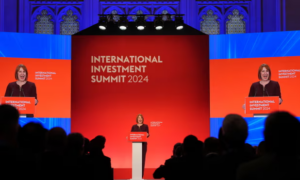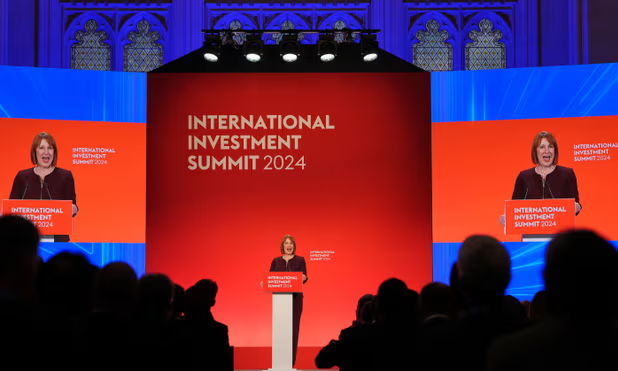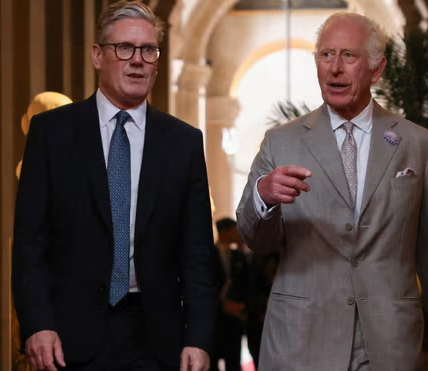Chancellor says businesses will understand balancing the books is necessary for fiscal stability

Rachel Reeves delivers her keynote speech during the international investment summit at Guildhall, London on Monday 14 October. Photograph: WPA/Getty Images
Rachel Reeves has dropped her strongest hint yet that she is planning to raise employer national insurance contributions in the budget, prompting accusations Labour is about to break its manifesto promises.
The chancellor used the government’s international investment summit at Guildhall in London on Monday to warn of tax rises to come in this month’s announcement, insisting that business would understand the need for fiscal stability.
After days of rumours that Reeves is planning to impose national insurance on employers’ pension contributions, the chancellor refused to rule out doing so, adding that executives would understand the need for such decisions.
“We will stick to the commitments we made in our manifesto,” she said. “But you know there is a £22bn black hole over and above anything we knew about going into the election that we need to fill, and that’s not just a one year, that persists throughout the forecast period.
“So we are going to need to sort of close that gap between what government is spending and bringing in through tax receipts. But we are going to be a government that sticks to our manifesto commitments, including that one [on not raising taxes on working people].”
Her message was underlined by Keir Starmer, who told the summit in his keynote speech: “Our public services need urgent care, our public finances need the tough love of prudence – challenges we can’t ignore. Because we know, just as every leader here knows, that those early weeks and months are precious, and no matter how many people advise you to ignore it, that you must run towards the fire to put it out, not let it spread further.”
Speaking as the government said nearly 38,000 UK jobs would be created after a total of £63bn of foreign investment was announced in areas such as renewable energy, datacentres and artificial intelligence, Reeves insisted tax rises on employers would not count as anti-business.
“Unless you put Britain on a stable economic and financial path, we’re not going to be able to get that investment in,” she said. “And that will mean some difficult decisions, including on taxation.
“But businesses get that. They know that we have got to pay for day-to-day spending through tax receipts, they want to see a path to balance the books, but we’ve got to do it in a way that is also ensuring that we remain competitive in the global economy.”
Reeves has insisted she will have to take painful decisions on tax in the budget because of the £22bn hole that Labour says they inherited from the last government. But critics say that hiking employers’ national insurance contributions would directly violate Labour’s manifesto commitment not to raise income tax, VAT or national insurance.
Paul Johnson, the head of the Institute for Fiscal Studies, told Times Radio on Monday such a move would count as a “straightforward breach” of the manifesto. “I went back and read the manifesto and it says very clearly, we will not raise rates of national insurance,” he said.
Jeremy Hunt, the shadow chancellor, posted on X: “It’s obvious to most people that raising national insurance would breach Labour’s manifesto pledge to … not raise national insurance!”
Labour has also been accused of watering down its manifesto commitment to invest £7.3bn in the National Wealth Fund, which it has set up to invest in green projects, after confirming the fund would only get £5.8bn. Officials said the remaining £1.5bn had been allocated elsewhere.
Reeves did confirm Labour would stick to its manifesto promise to keep corporation tax at 25%, however.




